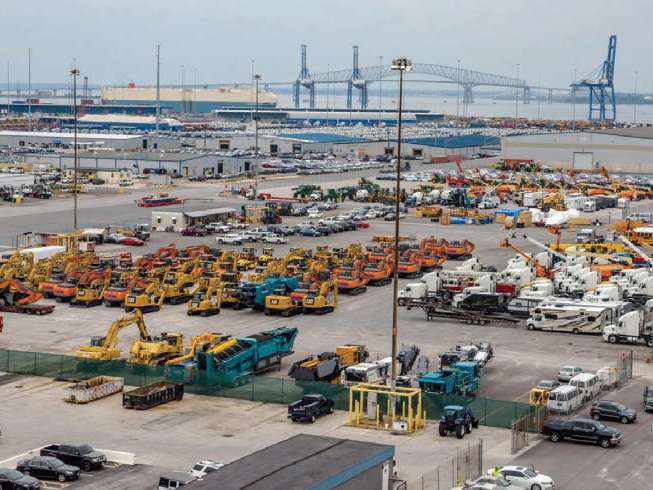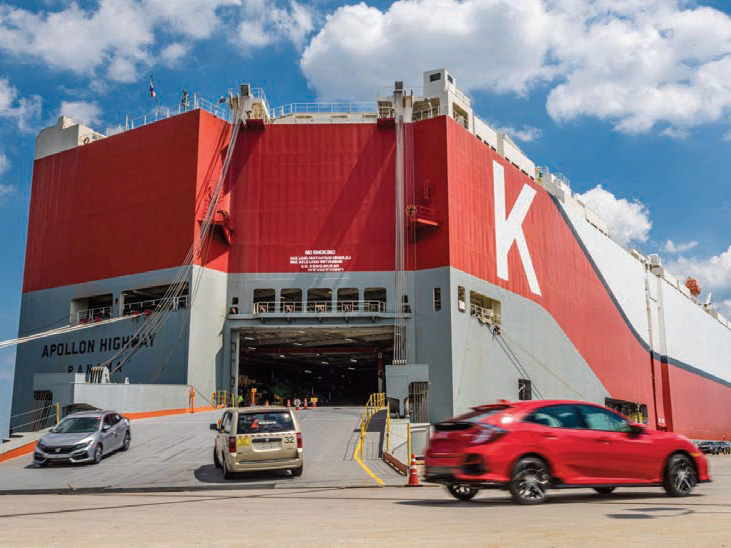Tradepoint Atlantic facility looking to increase auto processing capacity.
In May, the Port of Baltimore completed its 25th annual Ro/Ro Rodeo, a two-day training program for newly hired longshore workers to learn how to operate high and heavy machinery safely, and correctly. The event is emblematic of Baltimore’s leadership in the roll on/roll off transportation sector.
“No other port has a similar program like our rodeo,” noted William Doyle, the port’s executive director.
According to the United States Department of Labor, the transportation industry has one of the highest number of unplanned incidents, and, together with the construction and extraction occupations, accounted for nearly half of fatal occupational injuries in 2020. “Workers in transportation and material moving occupations and construction and extraction occupations accounted for nearly half of all fatal occupational injuries (47.4%), representing 1,282 and 976 workplace deaths, respectively,” noted a Department of Labor report, underscoring the need for safety events such as Baltimore’s Ro/Ro Rodeo.

Ceres Marine Terminals
The rodeo “provides our team and International Longshoremen’s Association (ILA) members with the opportunity to practice handling different types of machinery so that they are fully prepared for the job at hand,” said Zach Taylor, health, safety, security, and environment manager for Ceres Marine Terminals, a stevedore at the Port of Baltimore. “We make sure to go above and beyond to provide our team with the proper safety training and our customers with excellent customer service.”
Ceres Terminals is “dedicated to increasing safety initiatives for all locations,” Taylor added. “One of the ways that the company improves the safety focus is through safety stations for longshoremen to participate in safety training events, such as the Ro/Ro Rodeo.”
Baltimore is the top high and heavy ro/ro and auto port in the nation. Last year, the port handled a record 765,019 tons of imported high and heavy farm and construction equipment, ro/ro cargo, beating the port’s previous record of 603,516 tons in 2019. The port is “reconstructing our ro/ro berths,” said Doyle, “to better accommodate the larger and heavier pieces of ro/ro equipment in the industry and that are now being handled at the Port of Baltimore.”
On the auto side, Baltimore handled 750,163 cars and light trucks in 2022, dealing with more of those vehicles “than any other U.S. port for 12 consecutive years,” said Doyle. “Baltimore has been able to hold onto the top ranking for both high and heavy ro/ro and autos and light trucks because of our geographic location, being the closest East Coast port to the Midwest, and our highly skilled and experienced labor force.”
The port also has a “unique quality control program for both high and heavy ro/ ro vehicles and autos,” Doyle added. “This involves monthly meetings with all key logistics players to go over past performance and correct anything that needs correcting.”

Tradepoint Atlantic Distribution Center
Last year, BMW of North America opened a new vehicle distribution center at Tradepoint Atlantic, a 3,300-acre multimodal logistics and industrial center at the Port of Baltimore. The 35-acre site at the former Bethlehem Steel plant in Sparrows Point, includes a new 75,000 square-foot building, doubling the size of the BMW’s previous location at the port. BMW of North America also currently operates vehicle distribution centers in New Jersey, Georgia, Texas, and California, serving 350 BMW and 105 MINI dealers nationwide.
The new distribution center supports over 125 BMW and MINI dealers in the central and eastern parts of the United States. Besides receiving vehicles from manufacturing facilities and acting as a distribution hub, the site also performs vehicle inspections, repairs, accessory installations, vehicle programming, and maintenance. The facility has the capacity to process 100,000 vehicles annually.
The Tradepoint Atlantic location provides BMW with access to deepwater berths and proximity to rail and highway transportation. “The vehicle distribution center delivers significant supply chain advantages for dealerships and consumers,” said Kerry Doyle, managing director of Tradepoint Atlantic.
The BMW operation at Tradepoint Atlantic currently handles imported vehicles only, but there are plans to expand the operation to include distribution of domestically manufactured cars. “We may get involved in BMW’s mid-Atlantic distribution operation,” said Doyle, which could involve positioning vehicles assembled in South Carolina for rail transport to the Northeast. BMW’s production facility in Spartanburg, S.C., which opened in 1994, is the company’s largest in the world, having built over five million vehicles since opening, including over 400,000 in 2021.
The new BMW facility follows on the establishment of Volkswagen’s 150-acre location at Tradepoint Atlantic, which opened in 2018, becoming VW’s primary port of entry for the U.S. East Coast. “We continue to build volume on the import side,” said Doyle, “and we are also working with VW to develop a rail connection between their operations in Chattanooga, Tennessee, and Baltimore.”
Tradepoint Atlantic’s future expansion plans for ro/ro at the Port of Baltimore goes beyond the potential expansion of rail connectivity to Chattanooga for Volkswagen and South Carolina for BMW. “We’re working with a couple of different carriers as well as vehicle processors,” said Doyle, “and we are looking to expand our ro/ro footprint by anywhere from another 30 to 50 acres.” If that expansion comes to fruition, it could increase Tradepoint Atlantic’s ro/ro acreage to 200 in total and would provide the capacity to handle around 100,000 additional vehicles per year.
Tradepoint Atlantic’s ro/ro operation in Sparrows Point is something of a paradigm shift when it comes to the ro/ro business in North America. “This is an industry where vehicle processors usually control the real estate,” Kerry Doyle explained, “but we wanted to do direct deals with the OEMs and focus on having them plant their flag here for the long term. It’s because we are able to provide the substantial land mass as well as the infrastructure that we have put in place that we were able to secure long term relationships with Volkswagen and BMW.”
It’s no wonder that the Port of Baltimore is enthusiastic about Tradepoint Atlantic’s ro/ro developments. “Tradepoint Atlantic’s BMW vehicle processing center,” said Port Director William Doyle, “is going to help the Port of Baltimore sustain our top ro/ro ranking for years to come.”





